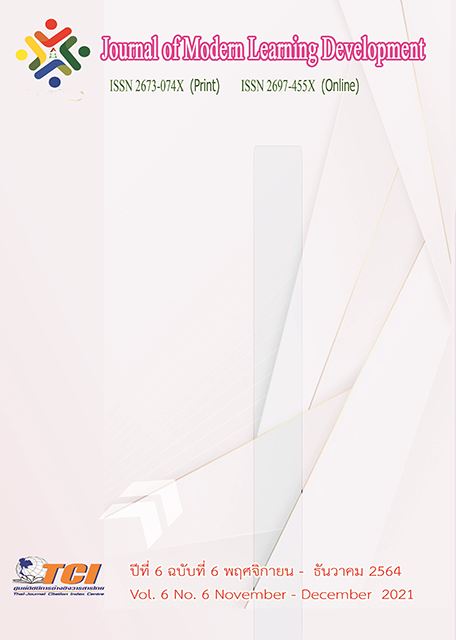Analysis of Desired Outcomes of Education Based on the National Educational Standards for Lower Secondary School Students
Main Article Content
Abstract
The purposes of the research were to 1) analyze the current stage of desired outcomes of education based on the national educational standards for lower secondary school students, and 2) compare the desired outcomes of education based on the national educational standards for lower secondary school students by gender, grade level and GPAX. This research was a descriptive research. Samples were 600 secondary school students, randomized by stratified - random sampling. The research instrument was a questionnaire which used a 5-point scale. The content validity of the scale ranged from .80 to 1.0 based on an index of item objective congruence by five experts. The reliability of the scale was .973 based on Cronbach’s alpha reliability coefficient method. The data were analyzed by using descriptive statistics including frequency, percentage, means, and standard deviation, as well as by inferential statistical methods, including t-test for independent sample, and F-test for one–way ANOVA.
The results showed that 1) the lower secondary school students had the desired outcomes of education, based on the national educational standards, at the moderate level ( = 3.246, S.D. = .778) overall, and when considering each component separately, it was found that all components were at a moderate level; 2) the lower secondary school students had no difference in the desired outcomes of education based on the national educational standards by gender, but there were differences by grade level and cumulative grade point average (GPAX) at the statistically significant level of .05.
Article Details
References
กาญจนา หฤหรรษพงศ์. (2562). การรู้ดิจิทัลของนักศึกษาระดับปริญญาตรีมหาวิทยาลัยวลัยลักษณ์. วารสารนวัตกรรมการเรียนรู้, 5 (2). 27–40.
จิตตรี พละกุล และเมษา นวลศรี. (2561). การวิเคราะห์องค์ประกอบพฤติกรรมความเป็นพลเมืองที่มีความรับผิดชอบของนักเรียนชั้นมัธยมศึกษาตอนต้น: กรณีศึกษาเขตพื้นที่ภาคกลาง. วารสารวิชาการมหาวิทยาลัยราชภัฏภูเก็ต. 14 (1), 1-22.
โรงเรียนสาธิตพัฒนา. (2563). หลักสูตรระดับมัธยมศึกษาตอนต้น. ออนไลน์. สืบค้นเมื่อ 9 สิงหาคม 2564. แหล่งที่มา: https://www.satitpattana.ac.th/web/secondary1.php
วัลลภา วงศ์ศักดิรินทร์ และ วายุภักษ์ วงศ์ศักดิรินทร์. (2560). พฤติกรรมการมีวินัยในตนเองของนักเรียนโรงเรียนสาธิตมหาวิทยาลัยศิลปากร. วารสารมหาวิทยาลัยราชภัฏยะลา. 12 (ฉบับพิเศษ), 100-111.
ศิริชัย กาญจนวาสี. (2552). ทฤษฎีการทดสอบแบบดั้งเดิม. (พิมพ์ครั้งที่ 6). สำนักพิมพ์แห่งจุฬาลงกรณ์ มหาวิทยาลัย.
สำนักงานเลขาธิการสภาการศึกษา. (2561). มาตรฐานการศึกษาของชาติ พ.ศ. 2561. ออนไลน์. สืบค้นเมื่อ 10 มิถุนายน 2564. แหล่งที่มา: http://qa.vru.ac.th/pdf/.pdf
สำนักงานเลขาธิการสภาการศึกษา. (2562). มาตรฐานการศึกษาของชาติ พ.ศ. 2561. บริษัท 21 เซนจูรี่ จำกัด.
สำนักงานเลขาธิการสภาการศึกษา. (2563). มาตรฐานการศึกษาของชาติกับการประกันคุณภาพการศึกษาของคนไทย. บริษัท 21 เซนจูรี่ จำกัด.
สุวิธิดา จรุงเกียรติกุล. (2561). การเป็นผู้เรียนรู้ตลอดชีวิต. ออนไลน์. สืบค้นเมื่อ 12 สิงหาคม 2564. แหล่งที่มา: https://www.trueplookpanya.com/blog/content/65649/-teaarttea-teaart-
Best, J. W., & Kahn, J. V. (2006). Research in Education (10 th ed.). New Delhi: PHI. Learning Private.
Cristobal, E., Flavian, C., & Guinaliu, M. (2007). Perceived e-service quality (PeSQ) Measurement validation and effects on consumer satisfaction and web site loyalty. Managing service quality: An international journal. 17 (3), 317-340.
Erkuş, A. (2003). Psikometri Uzerine Yazılar. Ankara: Türk Psikologlar Derneği Yayınları.


